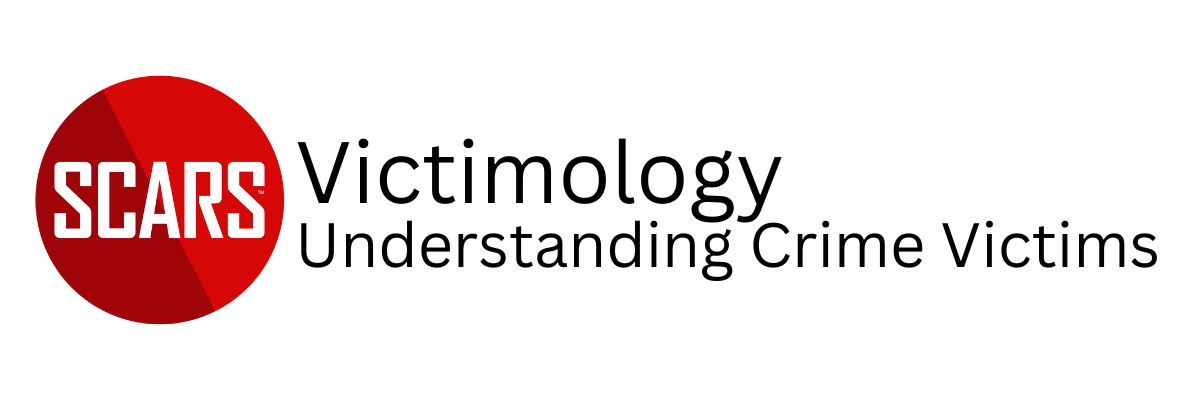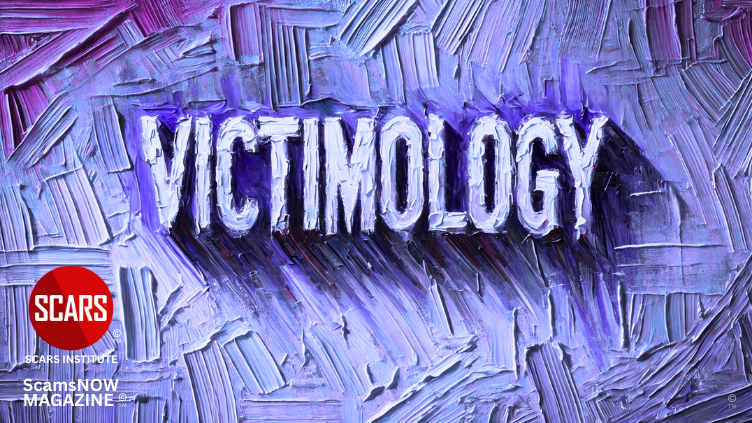The Science of Victimology – What Is It?
Understanding how the Victim Experience, Vulnerabilities, and Psychology are Studied
Primary Category: Scam Psychology
Author:
• Tim McGuinness, Ph.D. – Anthropologist, Scientist, Director of the Society of Citizens Against Relationship Scams Inc.
About This Article
Victimology, pronounced vic·tim·ol·o·gy, is the scientific study of crime victims and the psychological impacts of their experiences. As a branch of criminology and an aspect of sociology, psychology, and social anthropology, victimology examines the relationship between victims and offenders, exploring the causes, characteristics, and consequences of victimization.
Victimologists use the scientific method to research victimization, the criminal justice system’s response, and societal roles in prevention and support. Key figures in the field include Benjamin Mendelsohn and Hans von Hentig.
Victimology’s growth reflects the increasing recognition of victims’ importance in the criminal justice system. Professionals in this field work in diverse settings, influencing policy, developing victim services, and educating the public about victims’ rights and support systems.
By integrating insights from criminology, psychology, and related disciplines, victimology aims to support crime victims, enhance recovery programs, and inform public policy, making it a vital area of study and application.
Note: This article is intended for informational purposes and does not replace professional medical advice. If you are experiencing distress, please consult a qualified mental health professional.

A Note About Labeling!
We often use the term ‘scam victim’ in our articles, but this is a convenience to help those searching for information in search engines like Google. It is just a convenience and has no deeper meaning. If you have come through such an experience, YOU are a Survivor! It was not your fault. You are not alone! Axios!
The Science of VICTIMOLOGY
Pronounced: vic·tim·ol·o·gy
Introduction
Victimology is the study of the victims of crime and the psychological effects on them resulting from their experience. “specialists in victimology will study how best to help the victims of crime recover” and what causes vulnerability to crime.
Victimology is considered a science. It is a branch of criminology that scientifically studies the relationship between an injured party and an offender by examining the causes and the nature of the consequent suffering.
Victimology is also an aspect or sub-discipline of Sociology, Psychology, and Social Anthropology.
Victimologists use the scientific method to conduct research on a variety of topics related to victimization, such as:
- The characteristics of victims
- The causes of victimization
- The consequences of victimization
- The criminal justice system’s response to victims
- The role of society in preventing victimization
- How to support victims and promote recovery
Victimology is a relatively young field of study, but it has grown rapidly in recent decades. This growth is due in part to the increasing recognition of the importance of victims in the criminal justice system and the need to better understand the impact of victimization on individuals and society.
Some of the key figures in the development of victimology include:
- Benjamin Mendelsohn (1902-1976), who is considered the “father of victimology”
- Hans von Hentig (1889-1974), who developed the concept of victim precipitation
- Menachem Amir (1927-2018), who conducted pioneering research on the victim-offender relationship
- Klaus Sessar (born 1942), who is considered one of the leading victimologists in Europe
In the study of cybercrime or scam victimology, key figures include:
- Monica Whitty
- Casandra Cross
- Tom Sorell
Today, victimology is a thriving field of study with a wide range of applications. Victimologists work in a variety of settings, including universities, law enforcement agencies, victim advocacy organizations (such as SCARS,) and the criminal justice system. They use their research to inform policy decisions, develop victim services, and improve the criminal justice system’s response to victims.
Victimology Helps To Guide & Inform Victim Support
Victimology can be used to help support crime victims in a number of ways.
For example, victimologists can:
- Identify the needs of crime victims. Victimologists can conduct research to better understand the physical, emotional, and financial needs of crime victims. This information can then be used to develop and improve victim services.
- Develop and improve victim services. Victimologists can work with victim service providers to develop and improve programs and services that meet the needs of crime victims. This includes providing counseling, financial assistance, and other support services.
- Educate the public about victim rights and services. Victimologists can educate the public about the rights of crime victims and the services that are available to them. This can help to ensure that crime victims are aware of the resources that are available to them and that they are able to access those resources.
- Influence public policy. Victimologists can use their research to inform public policy decisions that affect crime victims. This includes advocating for policies that improve the criminal justice system’s response to victims, provide financial assistance to victims, and create a more supportive environment for crime victims.
Overall, victimology plays a very important role in helping to support crime victims. By identifying the needs of victims, developing and improving victim services, educating the public, and influencing public policy, victimologists can help to ensure that crime victims receive the support they need to recover from their victimization.
Here are some specific examples of how victimology has been used to help support crime victims:
- Victimologists have conducted research that has shown that crime victims often experience post-traumatic stress disorder (PTSD). This research has led to the development of new treatment programs for PTSD that are specifically designed for crime victims.
- Victimologists have worked with law enforcement agencies to develop victim notification systems such as VINE. These systems allow victims to be kept informed about the progress of their case and the release of the offender.
- Victimologists have worked with victim service providers to develop programs that help victims to rebuild their lives after a crime – this is what SCARS does.
- Victimologists have lobbied for legislation that provides assistance to crime victims, such as the VOCA Victims of Crime Act and others. This legislation has helped to ensure that victims have the resources they need to recover from their victimization.
Victimology is making a significant contribution to the support of crime victims. By continuing to research the needs of victims and develop new and innovative ways to help them, victimologists can make a real difference in the lives of those who have been affected by crime.
Victimology & Psychology
Victimology and psychology should be combined to create crime victim recovery programs.
- Victimology provides an understanding of the impact of crime on victims. Victimologists study the physical, emotional, and financial effects of crime on victims. This information can be used by psychologists to develop treatment programs that address the specific needs of crime victims.
- Psychology provides tools for understanding and treating the psychological effects of crime. Psychologists have developed a number of techniques for understanding and treating the psychological effects of trauma, including post-traumatic stress disorder (PTSD). These techniques can be used to help crime victims recover from the emotional and psychological impact of their victimization.
- Victimology and psychology can work together to develop comprehensive crime victim recovery programs. These programs can combine counseling, support groups, and other services to help crime victims heal from their victimization and rebuild their lives.
Here are some examples:
- SCARS recommends trauma counseling for all scam victims – go to http://counseling.againstscams.org to learn more.
- SCARS provides scam victim support groups to help guide victims through the recovery process – go to http://support.againstscams.org to learn more
Crime victim recovery programs are an important part of the overall criminal justice process. They help victims to heal from their victimization and to rebuild their lives. By combining victimology and psychology, these programs can provide victims with the support they need to recover from crime.
Victimology Is Built Into SCARS
At the Society of Citizens Against Relationship Scams, Dr. McGuinness is SCARS lead victimologist, but both Vianey Gonzalez and Lydia Zagorova are also victimologists.
VICTIMOLOGY IS A SIGNIFICANT AREA OF STUDY AND APPLICATION WITHIN SCARS SINCE ITS FOUNDING.
SCARS understands scam victims and combines our knowledge of victimology, criminology, trauma-informed care, grief counseling, sociology, and anthropology to assist crime victims through their post-crime experience.
In addition. SCARS bases its work on the leading research of criminologists, victimologists, psychologists, sociologists, and allied fields in our work by staying up to date on the research and published work of the leading professionals in the field. SCARS Team members have also published in research journals and are contributing to the overall body of knowledge about victims, supporting them, and their recovery.
How Can You Tell A Victimology Professional From An Amateur
Strangely, this is something that is relatively unique to the world of scam victims.
Here are some ways to tell a victimology professional from an amateur:
- Education and Training: A victimology professional will have a degree in victimology or a related field, such as criminology, social work, criminal justice, psychology, sociology, anthropology, etc. They will also have received specialized training in victimology, such as through internships or workshops.
- Experience: A victimology professional will have experience working with crime victims. This experience may include working in a victim service organization (such as SCARS,) law enforcement, the criminal justice system, or related professional fields.
- Knowledge of Victimology: A victimology professional will have a deep knowledge of victimology. This knowledge will include an understanding of the causes of victimization, the impact of victimization on victims, and the services available to victims.
- Skills in Working with Victims: A victimology professional will have the skills necessary to work with victims. These skills may include counseling, crisis intervention, victims’ assistance, and advocacy.
- Professionalism: A victimology professional will be professional in their interactions with victims. This includes being respectful, confidential, and empathetic; and following established standards and codes of conduct.
These factors listed above can give you a good indication of someone’s level of expertise in victimology or their lack of it.
If you are seeking help from a victim’s services provider, it is important to ask about their understanding of victimology and about their education, training, experience, and knowledge of victimology. You should also feel comfortable asking questions about their approach to working with victims. By doing your research, you can be sure that you are getting the help you need from a qualified professional.
How To Learn More About Victimology
There are many ways to learn more about victimology. Here are a few ideas:
- Take Courses in Victimology. There are many undergraduate and graduate courses offered in victimology at universities and colleges around the world. These courses can provide you with a comprehensive overview of the field of victimology.
- Read Books and Articles about victimology. There are many books and articles written about victimology. These resources can provide you with more in-depth information about specific topics in victimology.
- Attend Conferences and Workshops on Victimology. There are many conferences and workshops held on victimology throughout the year. These events can provide you with the opportunity to learn from experts in the field and to network with other people who are interested in victimology.
- Volunteer with a Victim Service Organization such as SCARS. Volunteering with a victim assistance provider or service organization is a great way to learn about the needs of crime victims and get involved in the field of victimology.
- Work in a Field Related to Victimology. There are many jobs that relate to victimology, such as social work, criminal justice, and law. Working in a field related to victimology can give you the opportunity to apply your knowledge of victimology in a practical setting.
No matter how you choose to learn more about victimology, you will be making a valuable contribution to the field. By understanding the impact of crime on victims and the challenges they face, you can help to improve the lives of crime victims and to make our communities safer.
Please Rate This Article
Please Leave Us Your Comment
Also, tell us of any topics we might have missed.
Leave a Reply
Thank you for your comment. You may receive an email to follow up. We never share your data with marketers.
-/ 30 /-
What do you think about this?
Please share your thoughts in a comment above!
-/ 30 /-
What do you think about this?
Please share your thoughts in a comment below!
More ScamsNOW.com Articles
-/ 30 /-
What do you think about this?
Please share your thoughts in a comment above!
SCARS LINKS: AgainstScams.org RomanceScamsNOW.com ContraEstafas.org ScammerPhotos.com Anyscam.com ScamsNOW.com
reporting.AgainstScams.org support.AgainstScams.org membership.AgainstScams.org donate.AgainstScams.org shop.AgainstScams.org
youtube.AgainstScams.org linkedin.AgainstScams.org facebook.AgainstScams.org
ARTICLE RATING
TABLE OF CONTENTS
CATEGORIES
MOST POPULAR COMMENTED ARTICLES
POPULAR ARTICLES
U.S. & Canada Suicide Lifeline 988
![NavyLogo@4x-81[1]](https://scamsnow.com/wp-content/uploads/2025/04/NavyLogo@4x-811.png)
ARTICLE META
WHAT PEOPLE ARE TALKING ABOUT LATEST SITE COMMENTS
See Comments for this Article at the Bottom of the Page
on Projection And Scam Victims: “The moment I realized I had a financial loss due to a scam I realized that I felt shame, guilt,…” Jul 13, 19:12
on Japanese Legend of Tears – When There Are No Words – 2025: “After discovering the fraud, the pain was enormous. I shed oceans of tears, but I always tried to do it…” Jul 13, 10:50
on The SCARS Institute Scam Victim Recovery Timeline – 2025: “Wow. I umm experienced some of the later curves. I have been bouncing back and forth between asking myself why…” Jul 11, 00:01
on Transference And Emotional Danger After The Scam – 2024: “Thank you for the kind but firm reminder that the person in the stolen profile photo has their own life.…” Jul 9, 01:26
on ‘Mental Defeat’ – The Unique Condition Of Giving Up – 2024: “Thank you for another great article. I can see from this article that mental defeat would be debilitating to a…” Jul 9, 00:49
on Trust: Romance Scams Betrayal And Scam Victims – 2024: “This provided valuable insight that I can identify with” Jul 8, 16:44
on A Scam Victim in Extreme Distress – Stopping the Pain – 2024: “Your trust issues are very understandable. We are very sorry this happened to you. We suggest that you contact an…” Jul 8, 14:42
on A Scam Victim in Extreme Distress – Stopping the Pain – 2024: “My online counselors advised me to check myself in. I went to the hospital because I was suicidal. After I…” Jul 8, 13:44
on Scam Victim Catastrophizing Making Recovery Difficult 2024: “Excellent article on catastrophizing. I can understand how this could take a person down a rabbit warren of never ending…” Jul 8, 12:12
on The Self-Pity Trap & How To Overcome It – 2023 – [UPDATED 2025]: “I am not in the habit of feeling sorry for myself. After the deception, although it was not easy at…” Jul 8, 11:49
on Pride – A Dual Edged Sword For Scam Victims – 2023 [UPDATD 2024]: “Looking back over my life I have seen how pride has impacted me both positively and negatively. However the negative…” Jul 8, 09:08
on The Self-Pity Trap & How To Overcome It – 2023 – [UPDATED 2025]: “I felt self-pity while the enormity of my financial loss washed over me like a tsunami. The self-pity lasted only…” Jul 7, 18:55
on The Uniqueness Of Scam Victims Or Fraud Victims – 2024: “unfortunately all true. It is highly stressful dealing with the aftermath. I am being sued for the money I borrowed…” Jul 6, 12:50
on Scam Victims & Mental Health Blaming – 2023 [UPDATED 2025]: “For most of my life words have defeated me, made me feel insignificant, unwanted, unneeded. For this reason it is…” Jul 5, 13:36
on Substance Abuse Susceptibility And Scam Victims – 2024: “It is understandable how some would feel that alcohol or substance abuse would be helpful in handling their feelings after…” Jul 1, 20:36
on Scam Victims Use Work To Avoid Healing: “The last 6 years have been the most difficult of my life. The pandemic, having both parents in the hospital…” Jun 29, 18:38
on Entitlement Mentality And How Scam Victims Often Lose Their Path To Recovery – 2024: “Thank you for this discussion of entitlement. I can see from the descriptions listed that I have not felt entitlement.…” Jun 29, 18:22
on Samurai Wisdom and Rituals for Clearing the Mind After Scam Trauma – 2025 – [VIDEOS]: “A great guide on how to move forward in our recovery process with a calm mind, cleansed on an ongoing…” Jun 28, 07:34
on Delayed Gratification and Patience in Scam Victim Recovery – 2025 – [VIDEOS]: “We want to recover quickly and… we make new mistakes. How not to speed up the recovery process, how to…” Jun 28, 06:41
Important Information for New Scam Victims
Please visit www.ScamVictimsSupport.org – a SCARS Website for New Scam Victims & Sextortion Victims
SCARS Institute now offers a free recovery program at www.SCARSeducation.org
Please visit www.ScamPsychology.org – to more fully understand the psychological concepts involved in scams and scam victim recovery
If you are looking for local trauma counselors, please visit counseling.AgainstScams.org
If you need to speak with someone now, you can dial 988 or find phone numbers for crisis hotlines all around the world here: www.opencounseling.com/suicide-hotlines
Statement About Victim Blaming
Some of our articles discuss various aspects of victims. This is both about better understanding victims (the science of victimology) and their behaviors and psychology. This helps us to educate victims/survivors about why these crimes happened and not to blame themselves, better develop recovery programs, and help victims avoid scams in the future. At times, this may sound like blaming the victim, but it does not blame scam victims; we are simply explaining the hows and whys of the experience victims have.
These articles, about the Psychology of Scams or Victim Psychology – meaning that all humans have psychological or cognitive characteristics in common that can either be exploited or work against us – help us all to understand the unique challenges victims face before, during, and after scams, fraud, or cybercrimes. These sometimes talk about some of the vulnerabilities the scammers exploit. Victims rarely have control of them or are even aware of them, until something like a scam happens, and then they can learn how their mind works and how to overcome these mechanisms.
Articles like these help victims and others understand these processes and how to help prevent them from being exploited again or to help them recover more easily by understanding their post-scam behaviors. Learn more about the Psychology of Scams at www.ScamPsychology.org
SCARS INSTITUTE RESOURCES:
If You Have Been Victimized By A Scam Or Cybercrime
♦ If you are a victim of scams, go to www.ScamVictimsSupport.org for real knowledge and help
♦ Enroll in SCARS Scam Survivor’s School now at www.SCARSeducation.org
♦ To report criminals, visit https://reporting.AgainstScams.org – we will NEVER give your data to money recovery companies like some do!
♦ Follow us and find our podcasts, webinars, and helpful videos on YouTube: https://www.youtube.com/@RomancescamsNowcom
♦ Learn about the Psychology of Scams at www.ScamPsychology.org
♦ Dig deeper into the reality of scams, fraud, and cybercrime at www.ScamsNOW.com and www.RomanceScamsNOW.com
♦ Scam Survivor’s Stories: www.ScamSurvivorStories.org
♦ For Scam Victim Advocates visit www.ScamVictimsAdvocates.org
♦ See more scammer photos on www.ScammerPhotos.com
You can also find the SCARS Institute on Facebook, Instagram, X, LinkedIn, and TruthSocial
Psychology Disclaimer:
All articles about psychology and the human brain on this website are for information & education only
The information provided in this and other SCARS articles are intended for educational and self-help purposes only and should not be construed as a substitute for professional therapy or counseling.
Note about Mindfulness: Mindfulness practices have the potential to create psychological distress for some individuals. Please consult a mental health professional or experienced meditation instructor for guidance should you encounter difficulties.
While any self-help techniques outlined herein may be beneficial for scam victims seeking to recover from their experience and move towards recovery, it is important to consult with a qualified mental health professional before initiating any course of action. Each individual’s experience and needs are unique, and what works for one person may not be suitable for another.
Additionally, any approach may not be appropriate for individuals with certain pre-existing mental health conditions or trauma histories. It is advisable to seek guidance from a licensed therapist or counselor who can provide personalized support, guidance, and treatment tailored to your specific needs.
If you are experiencing significant distress or emotional difficulties related to a scam or other traumatic event, please consult your doctor or mental health provider for appropriate care and support.
Also read our SCARS Institute Statement about Professional Care for Scam Victims – click here
If you are in crisis, feeling desperate, or in despair, please call 988 or your local crisis hotline.
More ScamsNOW.com Articles
A Question of Trust
At the SCARS Institute, we invite you to do your own research on the topics we speak about and publish. Our team investigates the subject being discussed, especially when it comes to understanding the scam victims-survivors’ experience. You can do Google searches, but in many cases, you will have to wade through scientific papers and studies. However, remember that biases and perspectives matter and influence the outcome. Regardless, we encourage you to explore these topics as thoroughly as you can for your own awareness.
















![scars-institute[1]](https://scamsnow.com/wp-content/uploads/2025/04/scars-institute1.png)
![niprc1.png1_-150×1501-1[1]](https://scamsnow.com/wp-content/uploads/2025/04/niprc1.png1_-150x1501-11.webp)

Thank you for this definition and for explaining what to look for to segregate experienced, real victimologists from amateurs. I also appreciate the various ways to educate yourself about victimology and how you can help victims, once you’re ready.
Another great article.